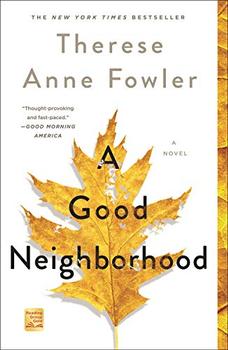Reading Guide Questions

Please be aware that this discussion guide will contain spoilers!
- Early in the novel, Juniper considers: "What, she wondered,
made a neighborhood good? To her parents, good seemed to mean there were mainly other people like themselves" (pg. 50). What do you think makes a "good" neighborhood, and is Oak Knoll one of them? As new houses are built in older, existing neighborhoods, do you think that changes the feel and culture of a place?
- Do you view the Whitman family as genuinely Christian, or is religion primarily a tool for Julia and Brad? Can both things be true at the same time?
- For Valerie, "tending her plants was her therapy" (pg. 7).
What about the natural world does Valerie take comfort in?
What does Valerie's dying oak tree come to represent for
her? With that in mind, do you think her lawsuit was
reasonable?
- Race can be a sensitive topic, and it features prominently in
A Good Neighborhood. How comfortable do you feel talking
about race, and do you think this novel changed your
perspective on the role that race plays in the United States?
- Of her new neighbors, Valerie acknowledges: "I basically
judged them from the second the chain saws started, and
that bothers me. I try to give everyone a chance, or how can
I complain when people pre-judge me?" (pg. 25). What
assumptions do these two families make about each other?
Which of these assumptions do you consider to be racist or
classist?
- Almost immediately, we are told, "Later this summer when
the funeral takes place, the media will speculate boldly on
who's to blame. They'll challenge attendees to say on camera
whose side they're on" (pg. 5). How does knowing that a
tragedy lies ahead change your reading experience?
- Who should shoulder the blame for the chain of aggression
between these neighbors? What actions could have been
taken by either family to tame the tension?
- The "Greek chorus" narrative style makes the reader a part of
the story, and complicit in the action. How did that affect
your reading? Who did you believe the "we" was in the book's
narration?
- Of music, Xavier says: "Classical was the one that made him
feel beauty, and he needed that feeling to help him get
through all the emotional noise in the world" (pg. 9). What
role does music play in Xavier's life? How does it shape his
sense of his future?
- "As our resident English professor would remind us, place,
especially in stories of the South, is as much a character
as any human, and inseparable from—in this case even
necessary to—the plot" (pg. 13). The novel is set in North
Carolina. How does the setting inform the story? Do
you think that attitudes and ghosts of history impact the
characters in the book?
- "How many nights in the past few years had Valerie waited
up for her son, praying that he and his friends not be stopped
by the police?" (pg. 17). In what ways are both Juniper and
Xavier taught to protect themselves? How do each of them
handle the sociocultural limitations that are put on their
bodies?
- Consider what Juniper's early life was like when Julia was
down on her luck. How does that experience shape what is
expected of her, and the choices she makes (including purity
vows, employment options)? What kinds of messages does
she receive about the kind of woman she should become?
- "As far as Juniper could see, Julia was all-in for all of it.
Between Blakely and New Hope, she was making certain her
daughters were groomed into angels-on-earth" (pg. 37). In
what ways did you view Julia as a victim or as an accomplice
to Brad?
- Did you recognize your teenage self in any of the young
characters in this novel? Like Juniper and Xavier, did you also
share a strong sense of desiring social justice?
- How is the love experienced by these teens different from
more mature versions? Do you think Xavier and Juniper have
good models for healthy adult relationships?
- "She wanted her daughter to value herself more than she,
Julia, had done as a teen, wanted her to see chastity as the
thing that made her the boss of her fate" (pg. 88). What did
you think about this notion that a woman's "purity" is her
"superpower"?
- The book club in the novel is reading and discussing
Vladimir Nabokov's Lolita. How does that classic novel echo
or amplify the action in A Good Neighborhood?
- What scenes with Brad did you find especially upsetting to
read? How does Brad justify his desires and urges, and did
you understand where he was coming from?
- Did you think Juniper was manipulated by her family and
the police into reporting the "crime"? In what ways is her
truth distorted by those in authority?
- "If you are a black person in the United States, you live each
day with the knowledge that this scene or one very much like
it may be in your future. You needn't have done anything
illegal or have broken any rule" (pg. 218). Did this statement
resonate with you? What other injustices does the author
explore in this book? Did you find you further explored your
own opinions on these hot button issues, or develop
different empathies along the way?
- How does the media coverage and news cycle contribute to
Xavier's fate?
- What are your thoughts on the novel's conclusion and
Xavier's choice? Do you think that justice was ultimately
served?
Unless otherwise stated, this discussion guide is reprinted with the permission of St. Martin's Griffin.
Any page references refer to a USA edition of the book, usually the trade paperback version, and may vary in other editions.

 Book Reviewed by:
Book Reviewed by:





